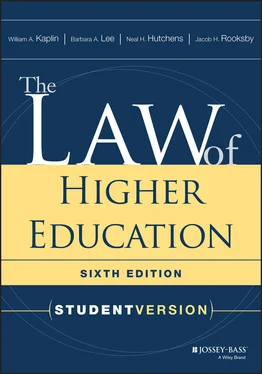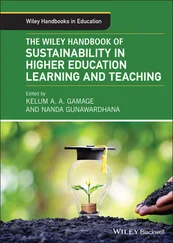Faculty members have been similarly active. Professors have sought legal redress after their institutions changed the professors' laboratory or office space, their teaching assignments, or the size of their classes or after research data or curricular materials were discarded when a faculty member's office was relocated. A group of faculty challenged their institution's decision to terminate several women's studies courses, alleging sex discrimination and violation of free speech. Female coaches have sued over salaries and support for women's teams. Across the country, suits brought by faculty members who have been denied tenure—once one of the most closely guarded and sacrosanct of all institutional judgments—have become commonplace. Increasing reliance by institutions on non-tenure-track faculty has resulted in contingent faculty seeking to advance their economic and professional interests, including through litigation and administrative actions involving their collective bargaining rights under federal or state law.
Outside parties also have been increasingly involved in postsecondary education litigation. Athletic conferences have been named as defendants in student athlete cases. University academic and athletic foundations have been the subject of lawsuits, including by donors or their families dissatisfied with the use of gifts. Universities have sued sporting goods companies for trademark infringement because they allegedly appropriated university insignia and emblems for use on their products. Broadcasting companies and athletic conferences have been in litigation over rights to control television broadcasts of intercollegiate athletic contests, and athletic conferences have been in disputes concerning teams leaving one conference to join another. Media organizations have brought suits and other complaints under laws requiring open meetings and public records. Separate entities created by or affiliated with institutions have been involved in litigation with the institutions. Drug companies have sued and been sued in disputes over human subjects research and patent rights to discoveries. And increasingly, other commercial and industrial entities of various types have engaged in litigation with institutions regarding purchases, sales, and research ventures. Community groups, environmental organizations, taxpayers, and other outsiders have also gotten into the act, suing institutions for a wide variety of reasons, from curriculum to land use. Recipients of university services have also resorted to the courts. For example, clients of a university's Center for Reproductive Health sued the university when the center gave fertilized embryos to unrelated couples without the consent of the parents of the embryos; another institution was sued for alleged mishandling of the cremated remains of a cadaver donated to the university's research program.
Other societal developments have led to new types of lawsuits and new issues for legal planning. And, of course, myriad government agencies at federal, state, and local levels have frequently been involved in civil suits as well as criminal prosecutions concerning higher education. Drug abuse problems have spawned legal issues, especially those concerning mandatory drug testing of employees or student athletes and compliance with “drug-free campus” laws. A technical college sought unsuccessfully to engage in mandatory, suspicionless drug testing of all its students before the policy was struck down by a federal appeals court. Federal government regulation of internet communications has led to new questions about liability for the spread of computer viruses, copyright infringement, transmission of sexually explicit materials, and defamation by cyberspeech. The rise of Massive Open Online Courses (MOOCS) and similar variations have sparked questions over student privacy and the use of Big Data in higher education. Outbreaks of racial, anti-Semitic, anti-Arab, homophobic, and political and ideological tensions on campuses have led to speech codes, academic bills of rights, and the eruption of a range of issues concerning student and faculty academic freedom. Initiatives to strengthen women's teams, prompted by alleged sex-based inequities in intercollegiate athletics, have led to suits by male athletes and coaches whose teams have been eliminated or downsized. Sexual harassment concerns have grown to include student peer harassment and harassment based on sexual orientation, as well as date rape and sexual assault. Hazing, alcohol use, and behavioral problems, implicating fraternities and men's athletic teams especially, continue as major issues.
The development of more relationships between research universities and private industry has led to more legal issues concerning technology transfer. Heightened sensitivities to alleged sexual harassment and political bias in academia have prompted disputes between faculty and students over academic freedom, manifested especially in student complaints about faculty members' classroom comments and course assignments. Recent disagreement in this area has included debates over the use of “trigger” warnings before the presentation of sensitive course materials. Increased attention to student learning disabilities and to psychological and emotional conditions that may interfere with learning has led to new types of disability discrimination claims and issues concerning the modification of academic standards or other accommodations. For instance, students have sued for the right to have emotional support animals in campus housing. Renewed attention to affirmative action policies for admissions and financial aid has resulted in lawsuits, state legislation, and state referenda and initiative drives among voters. Disputes persist on campus concerning the rights of lesbian, gay, bisexual, transgender, questioning, or queer (LGBTQ) individuals and student religious organizations that exclude these students from membership or leadership. Some advocates have contended that colleges and universities regularly discriminate against students and faculty who are politically and socially conservative. Controversy and legal conflict have also arisen over whether institutions should provide access to campus for speakers espousing views considered harmful or hateful to constituencies on campus and beyond.
As the number and variety of disputes have increased, the use of administrative agencies as alternative forums for airing disputes has grown alongside litigation in court. In some circumstances, especially at the federal level, the courts (and particularly the U.S. Supreme Court) have imposed various technical limitations on access to courts, redirecting complainants to administrative agencies as an alternative. Administrative agency regulations at federal, state, and local levels may now routinely be enforced through agency compliance proceedings and private complaints filed with administrative agencies. Thus, postsecondary institutions may find themselves before the federal Equal Employment Opportunity Commission or an analogous state agency; the National Labor Relations Board or a state's public employee relations board; the administrative law judges of the U.S. Department of Education or that Department's Office for Civil Rights (OCR); contract dispute boards of federal and state contracting agencies; state workers' compensation and unemployment insurance boards; state licensing boards; state civil service commissions; the boards or officers of federal, state, and local taxing authorities; local zoning boards; or mediators or arbitrators of various agencies at all levels of government.
Paralleling these administrative developments has been an increase in the internal forums created by postsecondary institutions for their own use in resolving disputes. Faculty and staff grievance committees, processes for appealing denials of promotion or tenure, student judiciaries, honor boards, and grade appeals panels are common examples. In recent years, mediationhas assumed a major role in some of these processes. In an effort to address concerns over the handling of student sexual misconduct allegations, some institutions have altered their procedures, such as adopting a single investigator model in a place of a hearing panel. In addition to such internal forums, private organizations and associations involved in postsecondary governance have given increased attention to their own dispute resolution mechanisms. Thus, besides appearing before courts and administrative agencies, postsecondary institutions may become involved in grievance procedures of faculty and staff unions, hearings of accrediting agencies on the accreditation status of institutional programs, probation hearings of athletic conferences, and censure proceedings of the American Association of University Professors.
Читать дальше












